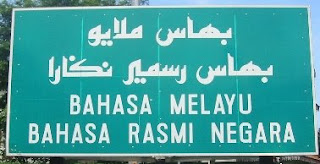 Using Arabic-based Jawi script at the top and the Roman alphabet at the bottom, this says: "The Malay Language is the official language of the country."
Using Arabic-based Jawi script at the top and the Roman alphabet at the bottom, this says: "The Malay Language is the official language of the country."When there is so much public encouragement for people to use Malay, why is it so hard for an expatriate like me to learn the language? Whenever I try to speak Malay to local people here, they always reply in English, so my opportunities to practise using Malay are virtually zero. It must be one of the hardest places in the world to try and master the national language.
One suggestion is that people reply in English because their English is good, so it is more natural to hold a conversation in English when my Malay is so obviously rather limited. While this is certainly true, in most countries people would be delighted to know that you are making an effort to learn their language, and they would go out of their way to help you even if they are able to speak good English. I went to Labuan recently, and the hotel staff were delighted to try to talk to me in Malay, even though their English was excellent.
So why not in Brunei? One possibility is that, although Standard Malay is the national language, it is rarely spoken outside of formal settings, and people feel uncomfortable using it in ordinary conversations. So maybe I should be trying to learn Brunei Malay instead! Except that there are no materials, so it would not be easy. At least I can get hold of newspapers and listen to TV broadcasts in Standard Malay, and there are one or two textbooks available.
One way or another, it is quite frustrating. But never mind, I will soldier on in my efforts to learn Malay. I believe it is important as a teacher of English to try to master the local language.
